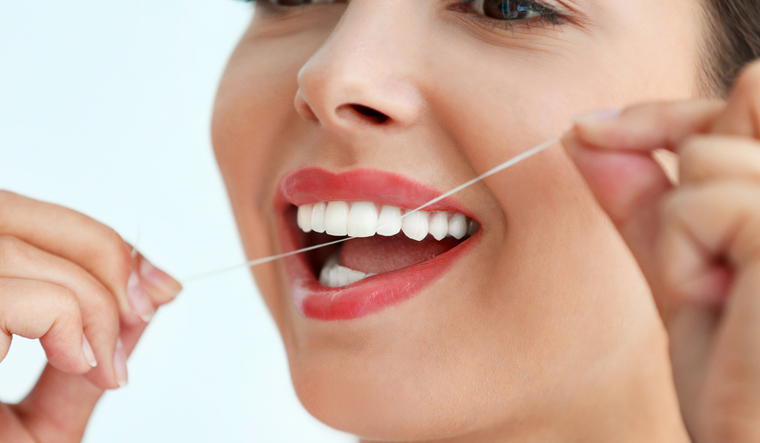Using some types of dental floss may contribute to elevated levels of toxic chemicals in the body which can lead to numerous health problems, a study claims.
The findings, published in the Journal of Exposure Science & Environmental Epidemiology (JESEE), provide new insight into how these chemicals end up in people's bodies and how consumers can limit their exposures by modifying their behaviour.
The study has linked Oral-B Glide dental floss to toxic Per- and Polyfluoroalkyl Substances (PFAS). PFAS are water- and grease-proof substances that have been linked with cancer, thyroid disease and fertility disorders, said researchers from the University of California, Berkeley School of Public Health in the US. PFAS are used in a range of consumer products, including fast food packaging, non-stick pans, waterproof clothing, and stain-resistant carpets.
People can be exposed to the substances directly through the products they use and the food they eat. They can also be exposed through indoor air and dust and contaminated drinking water.
Scientists are concerned about widespread exposure to PFAS in the population because the chemicals have been linked with health effects including kidney and testicular cancer, thyroid disease, high cholesterol, low birth weight, decreased fertility, and effects on the immune system.
Researchers measured 11 different PFAS chemicals in blood samples taken from 178 middle-aged women enrolled in the Public Health Institute's Child Health and Development Studies, a multi-generational study of the impact of environmental chemicals and other factors on disease. Half of the women in the analysis were non-Hispanic white and half were African American.
To understand how people's behaviour influences their exposure to PFAS, the researchers then compared the blood measurements with results from interviews in which they asked the women about nine behaviours that could lead to higher exposures.
Women who flossed with Oral-B Glide tended to have higher levels of a type of PFAS called PFHxS (perfluorohexanesulfonic acid) in their body compared with those who didn't.
To further understand the connection, the researchers tested 18 dental flosses (including 3 Glide products) for the presence of fluorine—a marker of PFAS—using a technique called particle-induced gamma-ray emission (PIGE) spectroscopy.
All three Glide products tested positive for fluorine, consistent with previous reports that Glide is manufactured using Teflon-like compounds.
In addition, two store brand flosses with "compare to Oral-B Glide" labelling and one floss describing itself as a "single strand Teflon fibre" tested positive for fluorine.
"This is the first study to show that using dental floss containing PFAS is associated with a higher body burden of these toxic chemicals," said Katie Boronow, a staff scientist at Silent Spring Institute in the US.
"The good news is, based on our findings, consumers can choose flosses that don't contain PFAS," Boronow said.
Other behaviours that were associated with higher PFAS levels included having stain-resistant carpet or furniture and living in a city served by a PFAS-contaminated drinking water supply.


